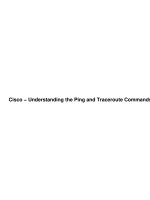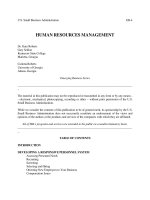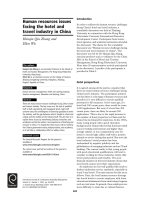Tài liệu Human resources issues facing the hotel and travel industry in China ppt
Bạn đang xem bản rút gọn của tài liệu. Xem và tải ngay bản đầy đủ của tài liệu tại đây (55.2 KB, 5 trang )
Human resources issues
facing the hotel and
travel industry in China
Hanqin Qiu Zhang and
Ellen Wu
The authors
Hanqin Qiu Zhang is an Associate Professor at the School of
Hotel and Tourism Management, The Hong Kong Polytechnic
University, Hong Kong.
Ellen Wu is an Assistant Lecturer at the College of Tourism,
Zhejiang Gongshang University, Hangzhou, Zhejiang,
People’s Republic of China.
Keywords
Human resource management, Hotel and catering industry,
Tourism management, Education and training, China
Abstract
There are many human resource challenges facing China’s hotel
and tourism industry. The key issues are: the lack of qualified
staff at both operational and managerial levels, high staff
turnover rates, the unwillingness of university graduates to enter
the industry, and the gap between what is taught in school and
college and the realities of the industry itself. The aim here is to
explore these issues by interviewing industry executives and
academics and via the authors’ own experiences of teaching and
research in China. It is hoped that these issues will be noted by
the Chinese government and by industry leaders, and academics,
as it will take a collaborative effort to address them.
Electronic access
The Emerald Research Register for this journal is
available at
www.emeraldinsight.com/researchregister
The current issue and full text archive of this journal is
available at
www.emeraldinsight.com/0959-6119.htm
Introduction
In order to address the human resource challenges
facing China’s hotel and travel industry, a
roundtable discussion was held at Zhejiang
University in conjunction with the Hong Kong
Polytechnic University International Executive
Development Center. Participants from hotels,
travel agencies, and academic institutions attended
the discussion. The theme for the roundtable
discussion was “Human resource challenges facing
the hotel and travel industry in China”. The
discussion was led by Dr Hanqin Qiu Zhang,
associate professor and co-ordinator for the China
MSc in the School of Hotel and Tourism
Management, Hong Kong Polytechnic University.
More than 20 representatives actively participated
in the discussion. A profile of the participants is
provided in Table I.
Hotel perspectives
It is agreed among all the parties consulted that
there are many human resource challenges facing
China hotel’s industry. The participants pointed
out that there is a shortage of human resources and
therefore it is very difficult to recruit qualified
personnel to fill vacancies. A few years ago, if a
hotel had 300 vacant posts, there would be some
3,000 applications. But now, if a hotel has 300
vacant posts, there are likely be around 200
applications. This is due to the rapid increase in
the number of hotel properties in China and the
related rise in demand for employees. In the 1990s,
many young people with a good education
background in China believed that hotels provided
a good working environment and higher than
average salaries. It was comparatively easy for
hotels to recruit high calibre staff with a positive
attitude to service during that period. But now, the
hotel industry’s social position has been
undermined by negative publicity and the
globalization of emerging industries such as ITand
banking. The current reality is that young people
with good educational qualifications will tend to
consider working for those industries which offer
better paid positions and benefits. The poor
financial situation in the hotel industry means that
most hotels cannot meet their expectations.
As employees are less well qualified this tends to
further undermine service standards, especially in
4 and 5 star hotels. The main reasons for this are as
follows. First, the local human resource shortage
has forced hotels to recruit employees with lower
educational attainments from undeveloped regions
such as rural areas. In general, these employees are
more difficulty to train due to cultural barriers.
International Journal of Contemporary Hospitality Management
Volume 16 · Number 7 · 2004 · pp. 424-428
q Emerald Group Publishing Limited · ISSN 0959-6119
DOI 10.1108/09596110410559122
424
Second, as there are too few suitable and qualified
candidates, hoteliers have had to promote
employees before they are ready to take on
supervisory and/or managerial responsibilities.
Third, as noted above, hotels cannot generally
offer competitive salary and benefit packages for
their employees due to the fact that many hotels
are not trading profitably. Further, most line
employees have been recruited as needed and
available and they tend to lack practical experience
and a positive attitude towards service roles. It is
also apparent that the current young generation
sees hotel work as a gateway to a job in a “higher
status” industry rather than as a life-time career
commitment.
Coupled with the above, it is difficult to recruit
qualified human resource managers. Most who are
currently employed in this role lack the experience
of designing an integrated human resource system.
This further undermines the hotel industry human
resource situation as the ethos of professionalism
in management methods and approaches is not
well established. Hotel staff turnover rates are
increasing and some well-known hotel brands
(such as Shangri-la and Holiday Inn) are
responding by operating their own training
centres. This development is greatly welcomed as
it advances the concept of training and career
development in a way that benefits the industry,
employers and employees in equal measure.
However, the problem here is that managers who
have completed advanced training tend to use this
to secure a higher salary and/or better work
environment elsewhere. Well-trained hotel
managers or supervisors with good English
language and management skills are very much
welcomed by banks and other organizations. In
part, this is the reason why those running newly
opened hotels are unwilling to invest in developing
their employees and where possible, they will
recruit pre-trained and experienced staff. The
Chinese hotel industry is growing at a rapid pace.
For example, more than ten, star-rated hotels will
open prior to the 2006 world leisure EXPO in
Hangzhou. This will make the current situation
even worse. The managers themselves, view this as
a serious problem. In order to solve it, some
retention strategies have been developed. One
example is based on the principles of succession
planning. Here, as soon as one staff member is
promoted, his successor is selected. Some hotel
companies are looking at life-time career planning
as a means of retaining their best managers.
The industry representatives at the roundtable
said that government is not giving sufficient
priority to human resource development, though a
personnel education department has been set up in
the tourism bureau. The department offers an
annual schedule of training programmes for heads
of departments and general managers, but most
think these are superficial and ineffective.
Representatives felt that on-going local
government sponsored training is needed and that
if this is to be effective, it needs to be systematic
and well organized.
The roundtable consensus from industry
representatives is that graduates from the hotel
schools and universities lack “hands on”
experience and a positive attitude towards service.
Most graduates are dissatisfied with pay,
supervision, working conditions, training and the
team environment (among others). Further,
experience shows that degree holders rapidly move
on – typically within several weeks of being
appointed to a hotel role. Graduates feel
undermined by their supervisors (who are unlikely
to be skilled, on-the-job trainers or experienced in
motivating their team) and claim that they cannot
readily see a career path from hotel operations
through to managerial roles. As morale and
motivation levels are low, the consensus is that
these are key contributory factors to the high
employee turnover levels.
Some argue that the “one-child” policy in China
has an unfavorable influence on the new
generation. Industry representatives felt that in
general, they do not possess the ability to adapt to
Table I Profile of the participants
No./Job title
Hotels
1 Director Shangri-la Harbin
2 Manager Grand Hyatt Shanghai
3 Asst Manager Radisson Hangzhou
4 Deputy General Manager Courtyard Shanghai Pudong
5 Manager Jinling Resort Nanjing
6 Deputy General Manager Holiday Inn Hangzhou
7 Front Office Manager Xindu Hotel Hangzhou
8 Chairman Tianma Hotel Management Company
Hangzhou
9 Asst Manager New Century Hotel Shenzhen
10 Dir. of Sales and Marketing Continental Hangzhou
11 Manager Zhejiang Hotel
12 Asst Manager Huaxia Hotel Xiamen
13 Human Resource Manager Jinling Hotel Nanjiang
Travel agencies
14 Manager Zhejiang Oversea Tourism Company
15 Manager Beijing Tiandi Travel Agency
16 Deputy General Zhejiang International Tourism Company
17 Manager Zhejiang Youth Travel Agency
Universities
18 Teacher City College, Zhejiang University
19 Teacher Jiangxi Finance and Economic University
20 Teacher City College, Zhejiang University
21 Teacher Zhejiang Commerce Vocational School
Human resources issues facing the hotel and travel industry in China
Hanquin Qui Zhang and Ellen Wu
International Journal of Contemporary Hospitality Management
Volume 16 · Number 7 · 2004 · 424-428
425
the pressures of the work environment because
they are unused to hard work and long hours in the
hotel. For historical reasons, most current senior
supervisors and managers in the age range from
30-40 graduated from middle school and did not
have the opportunity to continue on into higher
education. Newly recruited undergraduates are
under their supervision. This causes resentment
because the former place greater emphasis on
practical experience whereas the latter value the
insights that higher education has given them.
Some agree that high calibre staff should be paid
accordingly, as without improvements in pay and
benefits packages, it is almost impossible for hotels
to recruit good staff. But unfortunately, most hotel
general managers are employed on short-term
contracts and they are required to pay more
attention to reducing labour costs than developing
qualified people so as to secure profitability during
his/her contract period.
Expatriate managers occupy the majority of
managerial positions in China’s international
hotels. Most Chinese managers lack the
opportunity to progress, despite the fact that they
might be qualified for advancement. Some
complain that training programmes are too
operations oriented and that supervisory and
managerial training is rarely given to local
employees.
Travel perspectives
All industry representatives felt that the travel
agency sector will face a serious human resource
shortage in the near future and that the shortage of
high calibre employees will have a long-term
impact. In China, the travel sector has been
plagued with high turnover, particularly, among
tour-guides and middle-level managers and so
succession issues are a serious concern. Further,
retention strategies have not been developed to
tackle the problem. As with hotels, some travel
agency managers complain that there is no career
advancement training available to them, as general
management see cost reduction as a higher
priority. Aside from the retention issues, this type
of short-term thinking is the cause of resentment
and job dissatisfaction.
Adding to the problem, is the difficulty in
recruiting people to work in travel agencies in the
first place. The travel agency sector has difficulty in
attracting young graduates in English and Tourism
for the following reasons. Historically (up to 20
years ago) international tour guiding was viewed as
a good choice for graduates, as a guide’s monthly
salary averaged 100 RMB – similar or higher in
comparison with other industries. Today, a guide’s
monthly salary is between 400-500 RMB, which is
low in comparison with average income levels.
Even with commissions, the average total monthly
income is around 1,000 RMB. Most qualified
international guides graduate with a Bachelor’s
degree in English or Tourism. Thereafter, it is easy
to secure a job in banking, IT or commerce, with a
monthly salary ranging from 2000 RMB to
3000 RMB. This situation means that tour guides
average two to three years at most in the travel
industry before they secure a job elsewhere.
As with hotels, travel agencies find it difficult to
retain employees. There are a number of reasons
for this. First, the travel agency businesses tend to
operate at the lowest possible cost. If a tour guide
leads a group one day, he/she is obliged to pay the
travel agency per person fees the following day
(this is known as the rentou fee system) and it
contributes to high tour guide turnover. Second,
most tour guides and travel agency managers
describe their work as “routine”, with limited
career development prospects. Third, the average
age of general managers of international travel
agencies is around 50 years old. Although they
typically have a good educational background, the
majority do not engage in personal, professional
development. Yet it is essential for them to improve
their knowledge and skills and/or adjust their
managerial strategies to suit the current situation,
as China has changed dramatically over the past 20
years. It is pointed out that the average size of
travel agencies is diminishing and employees are
worried that this will affect sector development in
the long run. This is a key reason why travel agency
work is not viewed as a lifetime career, but as a
stepping stone to something else.
Finally, industry representatives agreed that
travel agents are likely to face a difficult future in
China, not least because the Internet has become a
convenient and cost-effective vehicle for tourism
product distribution, guest communications,
information delivery and commercial transactions.
University perspectives
Academic representatives are concerned that a
high proportion of students who are majoring in
tourism and hotel management do not want to
work in this industry. Teachers report that most
students are unclear about their futures, having
opted for the tourism and hotel management
courses because:
.
it was easy to gain entry to the course
(educational prerequisites were lower than for
other subjects);
.
it is easy to find a job after they graduate;
Human resources issues facing the hotel and travel industry in China
Hanquin Qui Zhang and Ellen Wu
International Journal of Contemporary Hospitality Management
Volume 16 · Number 7 · 2004 · 424-428
426
.
hotels are perceived as offering a nice working
environment; and
.
parents guided them to this particular career
path.
Most of them knew very little about hotels and
tourism before they entered college and many of
them experience a “reality shock” when they find
out more about hotel operations, especially when
they learn that they must start their careers in
operative roles. Arising from this, most teachers
say that their graduates will not apply for jobs in
hotels.
Some university teachers feel that it is
unnecessary for an undergraduate with a BA
degree to start their hotel career at the most junior
level. It is also felt that most students find it
difficult to adapt to the working environment,
especially in the first six months. For most
graduates, the initial two to three years of hotel
work is hard and they are not able to endure it.
Some university teachers feel that very little care
and attention is given by hotel management to the
graduates that they have recruited. Further, most
hotels do not provide management training
programmes or on-going career development
support. In short, most graduates resign because
they are ill equipped to cope with the pressures
they experience.
The concept of staff empowerment has yet to be
adopted in China, although there are tentative
steps being made in this direction. Currently, a
local brand hotel management company has
determined that greater employee empowerment
should appeal to the staff and so line employees
can make any decisions involving guest satisfaction
up to a cost of 20 RMB.
Since the 1990s, an array of Chinese universities
and colleges have offered degree courses in hotel
and tourism management, and some Master’s
degree programmes are well established. However,
the calibre of faculty is not sufficient to meet the
education requirements. There are a number of
reasons for this. First, most faculty members in
tourism departments are subject specialists in
history, statistics or geography, with no formal
hotel and tourism training or exposure. When they
deliver lectures, they typically read from a text
book. Second, higher level qualifications among
faculty (at master’s and doctoral levels) are very
limited.
There is some involvement and investment
from industry and commerce in China’s tourism
colleges but there are problems here too. First,
local government imposes some restrictions on
educational investment. Second, it is very
difficult for private colleges to recruit a qualified
dean with both strong academic and industrial
experience.
The industry’s expectation of education
All the roundtable representatives agreed that the
colleges and universities are currently unable to
meet the industry’s expectations for the following
reasons. First, tourism students lack orientation
before they start their courses. Furthermore, in the
first year, all subjects are basic ones, like English,
Mathematics, Chinese, Politics, Economics and
Party history. The students only start their major
courses in the second and third years. But most of
the specialist materials are outdated and teaching
faculty are not able to develop better teaching
materials due to the constraint of resource
limitations. In the fourth grade, students
commence internship programs in hotels and
travel agencies. But these internship programs are
not sufficiently well designed in order to integrate
the needs of industry and education.
Second, qualified teachers are rare and most
teachers are short of practical experience. That is
mainly why they deliver their lectures by reading
from text books. There are very few case studies
used in the classroom and faculty could do much
to improve both academic and practical skills.
Third, it is suggested that the universities,
colleges and other hotels schools should build
more links with the hotel and travel industry. For
example, the education sector might invite more
industry representatives to give guest lectures, so
that they can share practical experiences and skills
with the students. Further, the views of industry
representatives might be actively sought when
designing curriculum and course structures. An
advisory board of industry professionals would
help to ensure that the curriculum reflects industry
“best practice”. In addition, academics should
seek to collaborate with industry on applied
research and consultancy projects which would
benefit the whole community in the long run.
Where possible, students should be encouraged to
participate in educational visits to hotels and travel
sector operations. This will help them to better
understand the practical realities of the industry
and employer expectations of graduates.
Summary
Several conclusions can be drawn from this focus
group study. First, although China’s hotel and
tourism industry is developing rapidly, it seems
that human resource challenges are having a
negative impact. The major challenges are
employee retention, human resource shortages,
shortages of qualified managers and the
expectations gap between education and industry.
Second, China’s travel agency sector is facing
Human resources issues facing the hotel and travel industry in China
Hanquin Qui Zhang and Ellen Wu
International Journal of Contemporary Hospitality Management
Volume 16 · Number 7 · 2004 · 424-428
427
serious human resources problems. Retention
strategies are urgently needed, although it is not
seen as the top priority by general managers. It is
felt that national and provincial tourism
administration should be involved in helping to
resolve this problem in the short term. On-the-job
training needs to be organized for travel sector
managers and supervisors and provisions made for
succession planning. Third, there is a significant
expectations gap between tourism educators and
the industry. Industry executives and managers are
not satisfied with the performance of graduates.
This situation is made worse by the fact that the
industry does not appeal to graduates as a career
choice. The challenge then of narrowing the gap is
a strategic problem that needs the attention of all
stakeholders, and especially industry, academia
and government. The current curriculum is old
and outdated and inputs from industry-based
advisory panels are urgently needed, especially as
high calibre educators are rare. Finally, more needs
to be done to help educators to enhance their own
skills and experiences both of the industry in China
and internationally.
Human resources issues facing the hotel and travel industry in China
Hanquin Qui Zhang and Ellen Wu
International Journal of Contemporary Hospitality Management
Volume 16 · Number 7 · 2004 · 424-428
428









